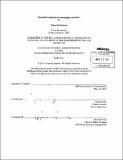| dc.contributor.advisor | Anjali Sastry. | en_US |
| dc.contributor.author | Segawa, Tsuyoshi, M.B.A. Massachusetts Institute of Technology | en_US |
| dc.contributor.other | Sloan School of Management. | en_US |
| dc.date.accessioned | 2013-09-24T19:37:32Z | |
| dc.date.available | 2013-09-24T19:37:32Z | |
| dc.date.copyright | 2013 | en_US |
| dc.date.issued | 2013 | en_US |
| dc.identifier.uri | http://hdl.handle.net/1721.1/81021 | |
| dc.description | Thesis (M.B.A.)--Massachusetts Institute of Technology, Sloan School of Management, 2013. | en_US |
| dc.description | Cataloged from PDF version of thesis. | en_US |
| dc.description | Includes bibliographical references (p. 30). | en_US |
| dc.description.abstract | Private health players in emerging countries have increased their presence and contributed to global health issues, but have been undervalued in financing. A variety of health players have evolved and hospitals have played a pivotal role. However, hospitals in developing countries face significant challenges in getting the financing they need to expand their operations by adding additional facilities and equipment partly due to under valuation. The objective of the thesis is to understand the fundamental values of those hospitals in emerging countries and to learn why under valuation happens by conducting the case valuation of Life Healthcare. This thesis is primarily intended to serve as an investment guide for potential investors and financers, such as commercial banks, investment funds, microfinance institutions, leasing companies, and other types of financial institutions. It discusses how the enterprise value should be assessed. The secondary audience is hospital management teams who want to understand the source of hospital value and key potential drivers for improvement. The thesis conducts the sensitivity analysis to identify how the key drivers affect the enterprise value. Accordingly, management teams can identify where to improve to maximize corporate values and satisfy customer needs. For these purposes, the thesis will be structured as follows. Summarizing recent trends of private healthcare industries in emerging countries, it starts with explanation of hospital business models and survey results of the financial issues in Romania. After examining two different valuation approaches, the paper will conduct valuation with the discounted cash flow model, taking the example of Life Healthcare Group, a private healthcare player in South Africa. The valuation results with third-party estimations identify the different assumptions, especially in terms of market growth and the weighted average cost of capital. Finally, the paper will explore other valuation issues and improvement ideas based on valuation results and comparative analysis. | en_US |
| dc.description.statementofresponsibility | by Tsuyoshi Segawa. | en_US |
| dc.format.extent | 30 p. | en_US |
| dc.language.iso | eng | en_US |
| dc.publisher | Massachusetts Institute of Technology | en_US |
| dc.rights | M.I.T. theses are protected by
copyright. They may be viewed from this source for any purpose, but
reproduction or distribution in any format is prohibited without written
permission. See provided URL for inquiries about permission. | en_US |
| dc.rights.uri | http://dspace.mit.edu/handle/1721.1/7582 | en_US |
| dc.subject | Sloan School of Management. | en_US |
| dc.title | Hospital valuation in emerging countries | en_US |
| dc.type | Thesis | en_US |
| dc.description.degree | M.B.A. | en_US |
| dc.contributor.department | Sloan School of Management | |
| dc.identifier.oclc | 857790446 | en_US |
